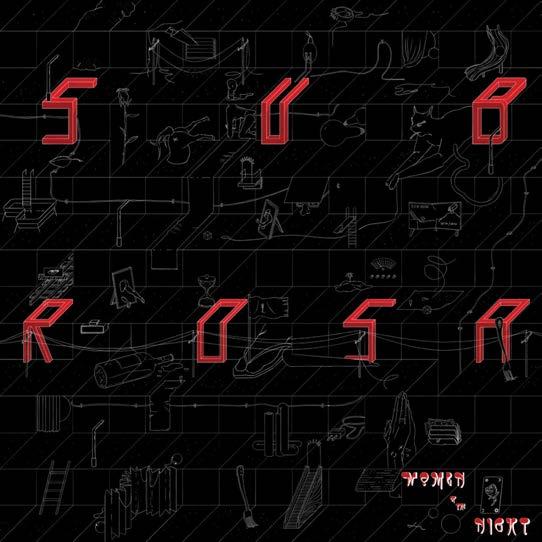
13 minute read
GENERAL ALBUMS
ALBUMS: General
RILEY CATHERALL WHEN I GO Independent
Advertisement
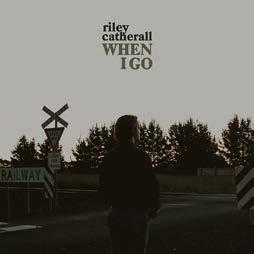
One of the standout features of Melbourne-based singersongwriter Riley Catherall’s debut album is that it is the sound of an artist in consummate control of his craft. Born and raised in Yass Valley (NSW), Catherall’s story includes tenures playing jazz and blues before he attended the CMAA Academy of Country Music and received invaluable writing experience with some of the industry’s best. When I Go has a clear streak of country running through it, but it also has a folk patina - of the wistful, reflective kind. It’s a blend that sounds like Neil Finn, Jason Isbell and Elliott Smith workshopping songs in Laurel Canyon. Most songs are mid-tempo, yet they rarely dissipate into the soft strumming void that many fall prey to. Catherall’s gentle musical approach might initially distract from the depth of reflective writing and poignancy in his lyrics – most of which are self-questioning or dissections of affairs of the heart, yet dig deeper and he’s guilty of many a cutting and memorable turn of phrase, particularly on ‘Germany’. Elsewhere, ’Leave Me Out To Dry’ has a heavenly chorus with a magic chord change, ‘No One’s Saint’ is a shimmering ballad laid bare, like the best of Wilco, while ‘Vacant Lot’, straightens up into a gently shuffling rock beat and some wonderful electric guitar tones. A quietly achieving and impressive debut album.
CHRIS FAMILTON 88 SEAN CHAMBERS THAT’S WHAT I’M TALKIN ABOUT Quarto Valley Records/Planet
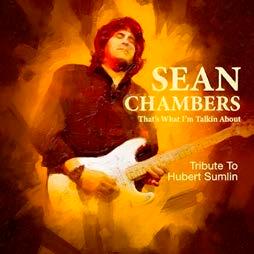
Hot shot Florida blues/rock guitarist Sean Chambers’ latest release is sub-titled Tribute To Hubert Sumlin, something he is better qualified than most to perform. Sumlin, of course, needs no introduction to blues afficionados; as Howlin’ Wolf’s guitarist from the mid1950’s until his death, he was instrumental in the Chicago blues sound. From the late 1990’s, Chambers performed a similar role in Sumlin’s touring band and is clearly well versed in the nuances of the Sumlin catalogue. Ten of the songs here formed the backbone of Sumlin’s shows, and the only original, ‘Hubert’s Song’, is a barnstorming nod to the diminutive guitarist “you taught me how to play the blues…..”. Like his mentor, Chambers is an incendiary guitarist, prone to flourishes of cascading, white hot notes, and the tempo rarely drops below full throttle. Whilst numerous songs are from the mighty Willie Dixon and Chester Burnett canon, there are several exemplary Sumlin compositions, kicking off with ‘Chunky’, a churning instrumental with Chambers trading licks with keyboard ace Bruce Katz. ‘Do The Do’ is a floor stomper with vocals closely emulating Howlin’ Wolf, Chambers blitzkrieg notes pour down over a swirling B3 on ‘Goin’ Down Slow’, gut crunching riffs power Willie’s ‘Sitting On Top Of The World’, and strings are bent right out of shape on the steamrolling ‘Howlin’ For My Darling’. Like Sumlin, Chambers’ vocals are good without being great, but, hey, that’s not what this is about. As a celebration of one of the greats of electric blues guitar, this comprehensively ticks every box.
TREVOR J.LEEDEN
KUTCHA EDWARDS CIRCLING TIME Wantok Musik/Planet
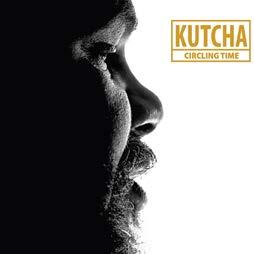
Just occasionally, coming across an album without any pre-conceived idea of what is enclosed or even who the artist is, has its own rewards. On first listening to Circling Time, one is completely immersed in the beauty of Kutcha Edwards voice. On second listening whilst perusing the booklet, the depth and meaning within Kutcha’s lyrics ignite a cultural awakening. Listening for the third time, the gracefully subdued ensemble imbues the music with rhythmic spirituality; it is glorious. These are songs that reflect upon the highs and lows of Kutcha’s life, a journey that encompasses injustice as well as jubilation. These songs are incandescent, sung not with an air of belligerence but with a spirituality that reaffirms a sense of love for family and for country; if “We sing for love/We live for justice/ We long for freedom/We dream of peace” does not touch the soul then perhaps the heart is made of stone. These nine songs, uniformly excellent, need to be heard as one, and yet, there are some that shine like diamonds. ‘We Sing’ (chorus above) floats on a massed choir of voices that renders the song an anthem, the elegiac tribute to his mother ‘Mrs Edwards’ is swathed in Dean Roberts’ atmospheric electric guitar, and ‘Singing Up Country’ is an exultant celebration that goes to the heart of indigenous cultural connection to the land. Circling Time is a magnificent, life affirming triumph, and Kutcha is quite possibly the finest contemporary Indigenous singer of his generation.
TREVOR J. LEEDEN
JACK HOWARD’S EPIC BRASS LIVE AT THE GERSHWIN ROOM Independent
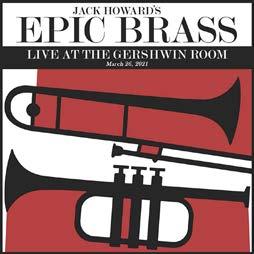
Call it The Great Australian Hornbook. As a member of Hunters & Collectors’ Horns of Contempt, Jack Howard is no stranger to Aussie songs featuring a horn section. As he mentioned in his memoir, Small Moments Of Glory, R.E.M’s manager doubted the validity of brass sections in rock ’n’ roll – until he heard the Hunnas. A couple of years back, Howard came up with the idea of a gig
ALBUMS: General

showcasing Australian brass songs. It’s a great concept. And the reality is immensely entertaining – Epic Brass should be a fixture at festivals around the country. This gig, at St Kilda’s Esplanade Hotel, certainly had an eclectic set list, with a diverse array of vocalists. Howard says it’s “like an Addams Family line-up of singers, full of quirk and character”, with Howard joined by Tex Perkins, Penny Ikinger, Steve Lucas, Fiona Lee Maynard, Helen Cattanach and Paulie Stewart. During ‘Soaking In It’, the Painters & Dockers frontman remarks, “When I look around and see the talent on this stage I think, ‘Paulie Stewart, you’re a fraud.’ These are great musos.” As well as the horn section – Howard and Travis Woods on trumpet, Paul Williamson on tenor sax, and Chris Vizard on trombone – there are not one but two bass players on stage – Steve “Never Play Badly” Hadley and Hunters & Collectors’ John Archer. “It’s like having Beyoncé and Kim Kardashian in the same band,” Stewart notes. “I think we peaked too early,” Howard says after he and Ikinger deliver a stirring rendition of the Wet Taxis’ ‘Sailor’s Dream’. But there are plenty of thrills to come, including Stewart’s terrific take on Jo Jo Zep and The Falcons’ ‘Shape I’m In’, Tex Perkins tackling The Birthday Party’s ‘Nick The Stripper’ (with Mick Harvey on guitar), a ripping version of the Oils’ ‘Best of Both Worlds’ sung by Steve Lucas, Fiona Lee Maynard’s incendiary ‘Beds Are Burning’, plus Howard’s own underrated solo gem ‘Let Me Live’. Howard also adds some horns to Skyhooks’ ‘Living In The 70’s’ (dedicating it to Michael Gudinski) and Divinyls’ ‘Boys In Town’. And the album concludes with a 13-minute version of an unreleased Hunters & Collectors song, ‘Rendering Room’, the first song Howard played live with the band, just down the road from the Espy, 40 years ago. At a time when most live albums are lifeless and super-slick, this is everything a live album should be – rough and raw and real. As bold as brass.
JEFF JENKINS
GARETH KOCH SALADIN’S DREAM Foghorn/MGM
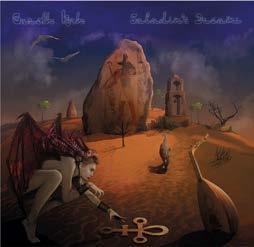
The first thing to make clear about Saladin’s Dream is that it’s a truly beautiful recording – evocative, sublime, exquisitely performed and produced by its creator, multi-instrumentalist and composer Gareth Koch, won himself an ARIA for Best Classical Album back in 2003 when he was part of guitar quartet Saffire, which featured Antony Field, Slava Grigoryan and Karin Schaupp. More recently he’s released three albums with the increasingly unstoppable Steve Kilbey, most recently The Hall of Counterfeits. I make these points because, according to the press release that came with my copy of Saladin’s Dream, the music is inspired by the “Scourge of the Crusaders”, Saladin (AlNasir Salah al-Din Yusuf ibn Ayyub, 1137-1193), or more specifically, what Saladin might have dreamed, and so, each of the dozen pieces on the album is ostensibly Koch’s musical interpretations of those dreams, as ancient gods and other apparitions are conjured up from the Sultan’s imagination. Koch does this by playing several instruments unique to the Middle East – the Oud, the yayli tambur (bowed long-neck lute) and the cümbüş, which looks a bit like a banjo, the latter pair from Turkey – alongside the more familiar acoustic, electric and bass guitars, keyboards and percussion. As you listen, the exotic “Arabic” elements begin to appear in the music in track 3, ‘Hurlyburly’, and then more obviously track 6, ‘Bazaar’. Track 9, ‘Harp of Anubis’, is subtitled ‘Tombeau Phillip Houghton’, a tombeau a musical composition “commemorating the death of a notable individual”, in this case the aforementioned Australian classical guitarist and composer who passed away at the end September 2017 at the age of 63. While Koch may have known Houghton, another connection might be the fact that Karin Schaupp was the first artist to record a complete version of Houghton’s composition, Stélé. Again, the press release tells us that track 4, ‘Graymaklin’s Knell’, references an imagined “surreal journey into the future, encountering Macbeth’s witches and their cats.”! Which is all very well, but apart from the titles of the dozen pieces on Saladin’s Dream, and of course the title itself, not a word of any of these “dreams and apparitions” appears anywhere on the record – not as lyrics – it’s purely instrumental – not as liner notes. So, since you, dear reader, won’t be receiving an accompanying press release, just sit back and let your imagination be carried away by the music.
MICHAEL SMITH MARGARET ANNE AND THE ROCK IT MAN SOUL LAID BARE Foghorn
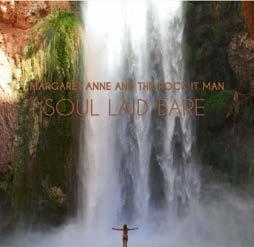
The opening song, ‘Don’t Look Back’, may have been cowritten with Shane Nicholson, while Luke O’Shea may duet with singer, songwriter and keyboards player Margaret Anne on the song they cowrote, ‘The Ones You Love’, and the title track might bring Steve Earle to mind, but Soul Laid Bare is no straightforward Americanainfluenced Australian country album. There’s the slinky funk of ‘Cabin Boy’ for a start, the brooding, driving rock of ‘Prison Day’ and the chugging ‘Free Tonight’, which allows The Rock It Man, multi-instrumentalist, producer and, as it happens, the music producer for the TV series Mythbusters, Doug Weaver to let rip with some tasty wah-wah guitars. You’ve heard his work on records by David Mason-Cox and Chris E Thomas among others, so he’s no slouch and brings some really creative arrangements and diverse, multi-layered sonic textures to Soul Laid Bare. Lyrically this is, in part, a break-up album, though there are stories drawn from happier times and also from other people’s stories (‘Prison Day’ – I hope!), which allows for those broader stylistic strokes and textures that stretch from the subtly sparse ballads ‘From You To Me’ and ‘My Mumma’, the latter featuring the guitar playing Margaret Anne’s brother Russell Fletcher, to the airily vast rock of ‘White Haze’.
MICHAEL SMITH
ALBUMS: General

SUICIDE SWANS RESERVATIONS
Near Enough Records
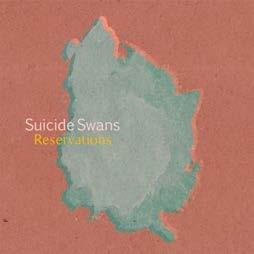
The latest album from the prolific Queensland alt-country band led by singer-songwriter Kyle Jenkins continues their stunning and world class run of releases. Each of their albums takes a different dusty back road or inner-city laneway through confessional songs of people and places. Here they frame their songs with tough and tender instrumentation. One minute there are gnarled electric guitars, the next a mournful violin or a tapestry of piano notes. Stylistically, think Dylan and Paul Kelly jamming with the Felice Brothers and you’re close to the mark as the band blend nervy, wordy analysis and introspection with woodsy, lilting folk and melancholic, ragged alt-country. Reservations feels like the most balanced of their albums, a sonically and poetically consistent set from start to finish. At its mid-point is the thrilling and taut scattershot country shakedown of ‘13th Floor (Alabam)’, It’s followed by the exquisite and churning ‘Wish Bone’ a song that seems to search for identity and one’s place in the world. Opener ‘You Should’ve’ is a raw assessment of a friend or lover at fault, while ‘Breathe’ flips the coin from blame to encouragement over a beautiful cornucopia of plucked strings and the heady, swaying rhythm section. This is an album that seems to question and accept the contradictions of the world and affairs of heart, and keep moving on, eyes to the horizon with a soul full of good intent.
CHRIS FAMILTON VARIOUS ARTISTS SEPARATE PATHS TOGETHER: Grapefruit Records/Planet

Milk Of The Tree was Grapefruit’s quite superb 2017 3-disc compendium of British female singer/songwriters from the late Sixties/early Seventies. Now comes Separate Paths Together: An Anthology Of British Male Singer/Songwriters (19651975), a beautifully annotated companion piece also spread liberally across 3-discs. Caught between the initial flushes of folk-era Dylan and the punk era, ‘singer/songwriter’ defined a wildly eclectic array of artists that ranged from those steeped in folk to others who would forge stellar careers in bands. The 66 featured artists follow a tried and trusted format. Instead of the hits, there are left field selections from household names and key figures such as Richard Thompson, Bert Jansch, Donovan, Al Stewart, John Martyn, Ralph McTell, Peter Sarsdtedt, Gerry Rafferty and Gilbert O’Sullivan. There are contributions from the ‘under the radar’ folkies and cult figures such as Bill Fay, Mick Softley, Steve Tilston, Wizz Jones, Michael Chapman, Kevin Ayers and Kevin Coyne. Songs from the hit writers are represented by 10CC’s Graham Gouldman (‘For Your Love’) and Tony Hazzard (‘Fox On The Run’, as in Manfred Mann, not Sweet!). One hit wonders are included, such as the superb ‘Days Of Pearly Spencer’ by the Northern Irish troubadour David McWilliams, and then there’s Ray Dorset (Mungo Jerry), Dave Cousins (The Strawbs), Jim Capaldi (Traffic)….and many more. It is, by any measure, a dazzling array of talent; four hours of buried treasure and the perfect complement to its distaff predecessor.
TREVOR J. LEEDEN
WOMEN OF THE NIGHT SUB ROSA Declared Goods/Heavy Soul
Women Of The Night might be based in Brooklyn, NYC, but at their heart is an expat Australian from Adelaide, singer, songwriter and guitarist Jordan D’Arsie, who moved there nine years ago, and that fact really does underpin the sound of this three-piece. Primarily a poet who’d fronted the odd punk and R&B Mod band after arriving in NYC, D’Arsie formed Women Of The Night four years ago and though their previous release, Pastel Colors, featured 13 songs, they dubbed it an EP and consider the 14-song Sub Rosa as their debut full-length album. On the more aggressive rockoriented songs D’Arsie’s vocal delivery has a lot of the Mick Jaggers about it, informed by the anger of late ‘70s US punk, as is the trio’s basic proto-garage sonic footprint. Truth be told of course, those American protopunks derived a lot from the sounds and swagger of the early Stones, whether they’ll ever admit or not, so it makes sense that songs like ‘Money’, with its snaky, almost Ronnie Lane bass lines, and ‘Open All Night’ should recall the UK ‘60s rather than mid-‘70s US punk. If anything, Women Of The Night sound like they could have comfortably emerged from a basement or garage in Carlton or Balmain in 1966 and slotted into the scene alongside The Missing Links and The Purple Hearts. ‘Lonesome Love’ reaches forward to, say, something like The Pelaco Brothers – certainly the indie inner-city sounds of Carlton and Darlinghurst of the mid-‘70s. Not that any Australian places or names appear anywhere. It’s just there’s an Australian sonic sensibility about it all. There are gentle, introspective moments too, in the ballads ‘Lonesome Love’ and ‘Everywhere Everyone (Now You’re)’. In writing Sub Rosa, D’Arsie reckons he noticed “the voices within the stories were often flickering between a sinister voice and a much lighter and optimistic voice.” That’s just what you get.
MICHAEL SMITH
